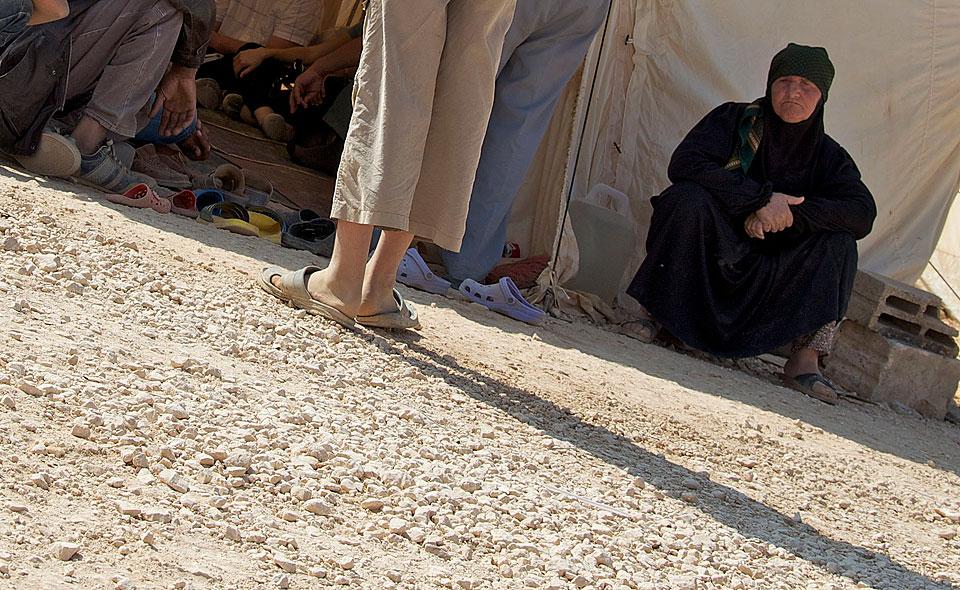Warm Clothing and Shelters for Syrian Refugees in Jordan

The LWF is helping refugees at Zaâatri camp prepare for colder weather by winterizing tents and providing warm shoes and clothing for children. © LWF/Thomas Ekelund
LWF to Provide More Support During Winter
In October, the Za’atri refugee camp is still a hot and dusty place but the coming onset of winter, when temperatures can drop to below zero at night, means Syrians who have sought refuge there urgently need protection from the cold.
The Lutheran World Federation (LWF)’s support to the camp residents includes provision of winterization kits and heaters for about 2,200 tents, blankets and quilts, and warm clothes for more than 10,000 children.
“The situation is difficult and complicated, and the oncoming winter season demands immediate action,” says Jaap Aantjes as he covers his face from the dust whipped up by the endless rows of heavy trucks entering and leaving camp Za’atri, which is located near the northern city of Mafraq.
Aantjes is the emergency program manager for an LWF joint program with the Jordan Hashemite Charity Organization (JHCO) to support Syrians fleeing the violence at home.
The United Nations High Commissioner for Refugees (UNHCR) stated that as of 7 October, almost 250,000 people had fled Syria into the neighboring countries of Lebanon, Iraq, Turkey and Jordan.
Out of the 105,215 receiving assistance in Jordan then, 55,462 people had been registered, another 22,729 had registration appointments and 27,024 people were waiting for registration in the Za’atri refugee camp.
Mahmoud Al Alomoch, camp manager at the JHCO, is also worried about how the camp will cope during winter. “In winter it will be very bad so we need more help,” he says.
In recent weeks, the situation at camp Za’atri has been tense. Protesting against what they say are poor living conditions, the refugees torched tents and hospitals and police had to use tear gas and batons to suppress the riots.
“The ongoing unrest shows the urgent need of psychosocial support,” Aantjes says, adding that while much has already been done, the needs remain great. “People living in camp Za’atri are used to a life of their own, a job and freedom to move. […] Now they are confined to the camp,” Aantjes explains.
Collaboration with Other Organizations
Under a Memorandum of Understanding with the JHCO, the LWF provides shelter, camp management, psychosocial support and education services for refugees in the camp.
The LWF office is based at the premises of the Amman congregation of the Evangelical Lutheran Church in Jordan and the Holy Land. The emergency program is still in its initial stages and currently has three staff persons. The focus now is on how to deliver assistance to the increasing number of refugees.
The LWF collaborates with non-governmental organizations and other partners in providing assistance to the Syrian refugees, Aantjes says. Together with the International Orthodox Christian Charities, the Middle East Council of Churches Department of Service for Palestinian Refugees, Finn Church Aid and Lutheran and other churches, the LWF participates in the local ACT Alliance forum in Jordan to coordinate humanitarian aid.
The LWF is a founding member of ACT Alliance, the global network of churches and their related organizations providing emergency humanitarian support.
Church of Sweden, an LWF member church, will provide the emergency program with two psychosocial consultants, which Aantjes describes as a much welcome contribution.
“The LWF as a member of ACT Alliance has a great potential to make a difference. There is a lot to do for the population in Za’atri camp but the most crucial thing for all of us here is that we work together,” Aantjes says.
The Jordan economy is affected by the global economic crises and the influx of Syrians is stretching its already limited resources, such as water and fuel. “People are fleeing for their lives. That is why we are here,” says Aantjes. The LWF really can make a difference, he adds.
“The LWF has a long history and longstanding expertise in refugee camp management and service delivery in places such as Kenya, Chad, South Sudan and Nepal, as part of our on-going Christian commitment to those in need, no matter their background,” LWF General Secretary Rev. Martin Junge remarked during a recent visit to Jordan.
(Written for LWI by Thomas Ekelund in Jordan)

